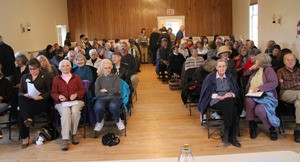The local League of Women Voters at first reserved the library’s meeting room for their Nov. 18 forum on health care, taxes and Catholic hospitals, but switched to the Grange at the urging of local health care activists, who told the League to expect a big crowd.
It was even a bigger crowd than expected. More than 130 people filled every seat and stood in doorways and along the walls to hear a wide-ranging discussion that touched on women’s health care rights, the state and federal constitutions and the Catholic Bishops’ Ethical and Religious Directives for Catholic Health Care, among other issues.
Dave Miller, President of the Greater Seattle Chapter of Americans United for Separation of Church and State, Jeff Mero, Executive Director of the Association of Washington Public Hospital Districts, Cynthia Stewart, Board Member of the League of Women Voters of Washington, and Monica Harrington, women’s health care advocate, presented their perspectives on health care and religion, and answered audience questions.
Miller focused on the First Amendment to the U.S. Constitution and Article 11 of the Washington Constitution, both of which, according to Miller, preclude application of the Bishops’ health care rules for Catholic hospitals funded in part with tax dollars.
He emphasized the “public money” sentence in Article 11: “No public money or property shall be appropriated for or applied to any religious worship, exercise or instruction, or the support of any religious establishment.”
Mero, long-time lobbyist for hospitals and now Executive Director of the Washington Public Hospital District Association, opined that the issues under discussion were “very, very important” to delivery of health care in the state – and the issues were almost certainly going to be decided by the Washington courts within the next ten years.
Reminding the group that “it’s hard to argue against religious freedom,” Mero pointed out that property taxes support 50 local hospital districts and 43 hospitals, many in rural areas and many, including PeaceIsland Hospital on San Juan Island, owned and operated by non-profit corporations affiliated with the Catholic Church. Mero, who avoided taking sides on the issues (“We all must be willing to listen and talk on both sides of the issue,” he said) reminded the crowd that the people of the state voted for reproductive rights for women and voted for life-ending options for terminally ill patients.
He said, “Hospitals across the state are sensitized to these issues, and women have raised awareness and raised the temperature of these issues.”
Harrington, who was raised a Catholic and attended Catholic schools as a child, reviewed two “horrific” examples of women in Washington subjected to Catholic hospital enforcement of abortion prohibitions in Catholic hospitals, and later pointed out that women affected by enforcement of Catholic health care directives “don’t want to get out front” on issues involving their own terminated pregnancies.
Harrington emphasized that the issues were about “more than abortion.” Pointing out that some Catholic hospitals, including PeaceIsland, were now saying that birth control was strictly a matter to be decided “in complete confidence” between a woman and her physician, Harrington reminded the audience that complete medical records showing birth control use must be made available for all health care purposes.
She also said that Catholic hospitals would not perform vasectomies or tubal ligations for contraceptive purposes and that the all-male bishops’ position required close linkage of all sex acts to procreation and conception. “I’ve probably never had sex in my life in a way that a Catholic bishop would approve of,” said Harrington to a few chuckles and raised eyebrows.
The forum continued for two hours. All participants remained civil throughout, and from the questions asked and conversations before and after, both sides are not about to yield on their positions.




